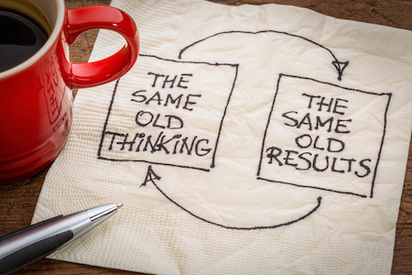 It’s hard to see a child unhappy. That’s why adults often rush in to offer immediate relief. But as psychologist Susan David, author of Emotional Agility, points out, this doesn’t help children in the long run. When teachers help preschoolers manage emotions in the classroom, those children become better problem solvers when faced with emotional situations, and are better able to engage in learning. In teenagers, “emotional intelligence”—the ability to recognize and manage emotions—is associated with greater self-esteem and ability to manage stress. Dr. David offers four steps for helping a child go through, rather than around, a negative emotion and emerge ready to move on:
We want to hear: What do you do when a child is having difficulty grappling with an emotion? To join the conversation, click "comments" on our Community of Practice Forum. If you would like to read more about creating a habit around masterful communication, check out our book: Be Quiet, Be Heard: The Paradox of Persuasion
0 Comments
 Saying “thank you” is the ultimate win/win. Research shows that expressing gratitude increases feelings of personal well being. If you are looking for someone to practice your “thank you’s” on, start close to home. John Gottman, Executive Director of the Relationship Research Institute of Seattle says: “Masters of relationships have a habit of scanning the world for things they can thank their partner for. People whose relationships go down the tubes scan the world for their partner’s mistakes.” We want to hear: What happened when you upped the level of thanks you expressed to people around you? To join the conversation, click "comments" on our Community of Practice Forum. If you would like to read more about creating a habit around masterful communication, check out our book: Be Quiet, Be Heard: The Paradox of Persuasion  A Purdue University evolutionary scientist studied chicken egg-laying productivity. He selected just an average flock, and let it alone for six generations. He also created a second flock of only the most productive chickens for breeding -- a.k.a. super-chickens. After six generations the average group’s egg production had increased dramatically. In the super chicken group, only three chickens survived. They'd pecked the rest to death. As author Margaret Heffernan notes in her Ted talk on competition ,”The individually productive chickens had achieved their success by suppressing the productivity of the rest.” Heffernan notes that many people compare that super-flock of “killer pecking chickens” to their own companies which reward ultra competition. Even with the mounting body of evidence demonstrating that groups that collaborate effectively far outperform individuals, most of us have been encouraged throughout life to compete in most everything—from youth sports to college admissions to “climbing the corporate ladder.” Must collaboration undermine an individual’s drive to shine? Heffernan says no. As she points out, people we think of as “stars” are really highly skilled collaborators. Notes Hefferman, “I sat in on the auditions at the Royal Academy of Dramatic Art in London. And what I saw there really surprised me. The teachers weren't looking for individual pyrotechnics. They were looking for what happened between the students, because that's where the drama is…And when I went to visit companies that are renowned for their ingenuity and creativity, I couldn't even see any superstars, because everybody there really matters.” We want to hear: Is your workplace a “super-chicken” environment? What could be done to instill a more collaborative approach? To join the conversation, click "comments" on our Community of Practice Forum. If you would like to read more about creating a habit around masterful communication, check out our book: Be Quiet, Be Heard: The Paradox of Persuasion.  Multitasking—for example, pausing while you read this blog to toggle to a new email and back—has been shown in many recent studies to lead to errors and distraction. Nevertheless, our gadgets enable multitasking to the point where monotasking (a.k.a. “single-tasking” or, simply, doing one thing at a time) has become a skill that needs to be practiced. Any experience can be improved by paying full attention to it, says Kelly McGonigal, a psychologist, Stanford lecturer, and author of The Willpower Instinct. Listening is among the most important of these experiences. “Practice how you listen to people,” McGonigal urges. “Put down anything that’s in your hands and turn all of your attentional channels to the person who is talking. You should be looking at them, listening to them, and your body should be turned to them. If you want to see a benefit from monotasking, if you want to have any kind of social rapport or influence on someone, that’s the place to start. That’s where you’ll see the biggest payoff.” We want to hear: In what circumstances do you feel you give your full attention when someone else is speaking? Would you like to improve the frequency with which you do this, and what strategies can you share? To join the conversation, click "comments" below. If you would like to read more about creating a habit around masterful communication, check out our book: Be Quiet, Be Heard: The Paradox of Persuasion  How we react to negative feedback can determine our influence, our impact and even our legacy. If we perceive criticism as a personal attack or if we berate ourselves for being less than perfect, our reaction prevents us from receiving the potential benefits. Writing in the Harvard Business Review, William Treseder, founding partner at BMNT consultancy in Silicon Valley, suggests trying these strategies instead:
“When someone helps you identify your weaker areas,” says Treseder, “the habit of using their feedback to slingshot your growth will let you make huge strides over time.” We want to hear: Can you offer an example of how embracing negative feedback led to improvement on your part? To join the conversation, click "comments" below. If you would like to read more about creating a habit around masterful communication, check out our book: Be Quiet, Be Heard: The Paradox of Persuasion  Getting-to-know-you games can seem like they’re making an awkward situation more so, whether at freshman dorms or corporate retreats. But psychologist Anton Villado insists that icebreakers work. Formerly a Rice University professor and now a consultant to businesses who want to improve company culture, Villado says icebreakers accomplish three things:
Susan Mohammed, a professor of industrial and organizational psychology at Penn State, says that the key to getting something out of an icebreaker is managing your expectations. We agree that icebreakers are just a start to creating a climate that encourages comfortable interaction. Building genuine trust requires time, shared experiences, and ongoing communication. We want to hear: What’s your favorite group icebreaker? How does it work and why do you think it is so successful? To join the conversation, click "comments" on our Community of Practice Forum. If you would like to read more about creating a habit around masterful communication, check out our book: Be Quiet, Be Heard: The Paradox of Persuasion |
Archives
July 2024
Categories
All
|
|
Glaser & Associates, Inc.
Executive Offices 1740 Craigmont Avenue, Eugene, OR 97405 541-343-7575 | 800-980-0321 [email protected] |
© 2019 Glaser & Associates. All Rights Reserved.


 RSS Feed
RSS Feed